MIFF 2018 Week One Report: Tales Of Ghosts, Wars & Refugees
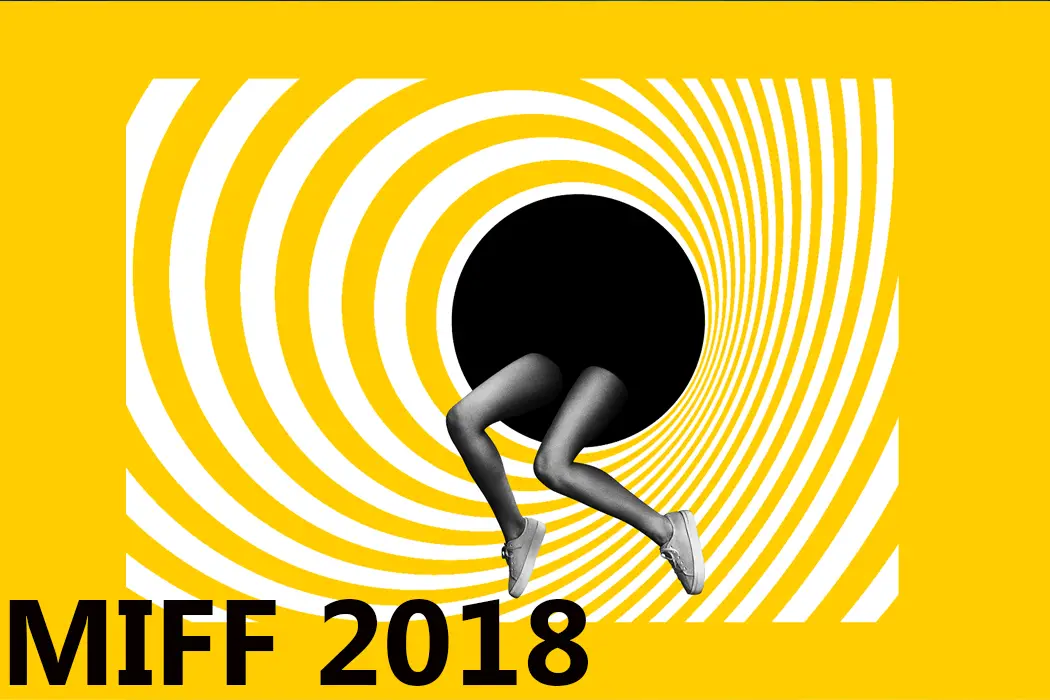
Alex is a 28 year-old West Australian who has a…
My experiences at the 2018 Melbourne International Film Festival continue – after 1.5 weeks of film-filled days I’ve seen 29 titles, an array of international productions that include the hottest releases from Cannes (The Man Who Killed Don Quixote, Burning, Climax), awaited follow-ups from emerging directors (Fugue, Damsel, Los Silencios) and some celebrated documentaries (Ryuichi Sakamoto: Coda, Three Identical Strangers), which has made this an incredibly fruitful period in catching up with some of the year’s most anticipated releases.
Fugue (Agnieszka Smoczynska)
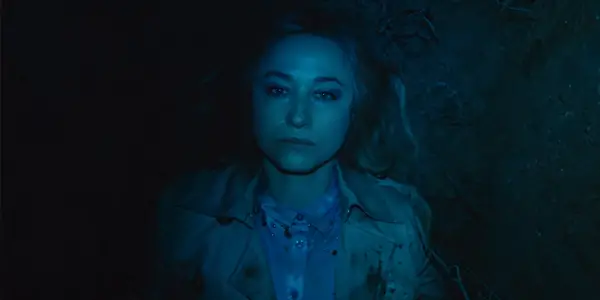
It must’ve been hard for Agnieszka Smoczynska to pick her follow-up project after debuting with something as audacious as The Lure, the critically acclaimed Polish musical about the love triangle between two mermaid sisters and a man. Her sophomore effort, Fugue, manages to be quite the surprise again – a quiet, intimate but lethargic drama about an amnesic woman delivered with a raw, confrontational style that is the complete opposite to her previous journey into the world of cabaret mermaids. Smoczynska’s intentions with Fugue are admirable, a haunting personality study that lulls us into a false sense of familiarity, before springing her surprises like a baited trap. But instead I found myself lulled into sleep, fatigued by countless scenes of evasive opaqueness and stilted kitchen sink conversations that make for a film that I strongly doubt will live on outside of the festival circuit.
Emerging out the darkness of the train tracks in an underground Warsaw station, Alicja (Gabriela Muskala, who also wrote the screenplay) appears dazed, walking with the same lost cadence of Mary from Carnival of Souls. Alicja ain’t no ghost tho, despite all of the initial signs pointing towards the conclusion – after publicly urinating in the busy train station (which provides for a memorable opening), she seems to just exist as a lost spectre, with absolutely no memory as to who she is or was, until an fight with a policeman gets her on public television (in a scene which plays very closely to Le Femme Nikita). A daytime talkshow’s national plea to identify her actually works, linking her back with her cautious but confused family, a miserable bunch that includes a forgotten husband and son who accept her return with the same detached response that hearing that dinner is ready is given.
As she slowly forms a mosaic of her former life, a past which included a job as a geography teacher, anything to do with her past marriage eludes her, making her matrimonial reintegration feel more like a painful adoption, rather than a heartwarming comeback. The biggest mistake that Smoczynska makes is that she keeps dropping signs towards a supernatural answer for Alicja’s lost years, heavily hinting at an animalistic alter ego through a series of visual clues and suspense tricks; abstract dream sequences, Alicja’s indifference to walking around her home bottomless, and even her leopard print pants are just some of the inklings given, but much like the similarly vague It Comes At Night, they’re all intriguing teases that don’t lead anywhere. Outside of these fantastical elements, the screenplay is bare and functional, while the burden of the narrative and shifting emotional patterns are carried visually, including a cold, but effective central performance by Muskala – its just a shame that’s its all in service for something so unrelentingly dreary.
Damsel (Zellner Bros)
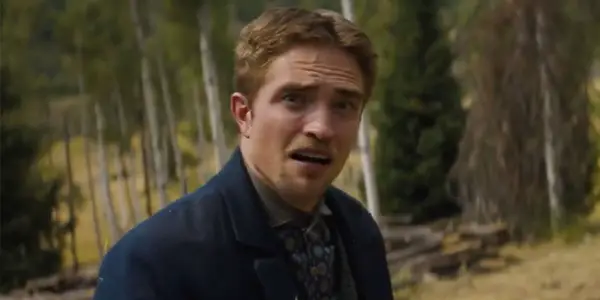
After bending the rules of the biopic with Kumiko the Treasure Hunter back in 2014, the Zellner brothers are back to tackle another ingrained cinematic genre with Damsel, a middling post-modern Western that touches upon a variety of contemporary issues, such as gender equality and male entitlement, by flipping the clichés of the Western genre on their head. By taking the focus off the expected cavalcade of gun-slinging cowboys and indians, David and Nathan Zellner have decided to magnify the marginalised roles for females in these dime novel stories, characters that are usually relegated to be either prostitutes, barmaids or, as its title implies, damsels in distress.
Damsel isn’t so much an action picture as it is a romantic drama dressed up in an old west outfit, featuring its own lovestruck protagonist travelling unforgiving desert landscapes in search for a long lost love. Our plucky traveler this time is Samuel, another great role for Robert Pattinson that further cements his successful transition out of being labeled “That guy from Twilight“. Recruiting a local drunk-turned-makeshift preacher Parson Henry (David Zellner), Samuel is on a journey to rescue Penelope (Mia Wasikowska), who has apparently been kidnapped by an unidentified gang. All of the recognisable story beats are here, but the screenplay, also written by the Zellner Bros, refuses to conform to any traditional structure, keeping their true intentions close to heart for most of the comedic first half.
I won’t spoil the alternative direction that the plot takes, but those who have played the popular video game Braid might have some foresight into their progressive treatment of Penelope, rewarding her with a richer definition than just “pining love interest”. Unfortunately, after the main gag has been revealed, it feels like the film doesn’t have anything much else to say, padding out its sluggish third act with the cinematic equivalent of small talk; bumbling, inconsequential scenes that carry zero momentum, observing the characters as they, and seemingly the Zellners, have no clue as to what they’re gonna do next. It’s a looseness that only works if the lost, existential nature is the primary point, an example being Jim Jarmusch’s approach with Dead Man. During the tedious ending, Penelope asks if Parson Henry is actually a preacher, to which he answers “No, not in the conventional sense, but my hearts in the right place”, which is honestly a pretty useful metaphor for the Zellner’s interpretation of the Western – unconventional, affectionate but indecisive in what it actually wants to be.
Shoplifters (Hirokazu Kore-eda)

Kicking off with a charming fist-bump between a father and his adopted son, Hirokazu Kore-eda’s Shoplifters begins with the titular activity being performed, an orchestrated routine that has the male pair acting as thief and cover, using slight hand gestures to skilfully pilfer their desired groceries. Its all done in complete silence, a low-key caper that feels like Jules Dassin’s iconic Rififi heist being reenacted within a local convenience store, delivered with the same clear-cut precision and sense of honor among thieves that graced the best of Jean Pierre-Melville’s work. Don’t be fooled, though, this is not a heist film despite the introduction, but a clever way for Kore-eda to present his main thesis in such an elegant and entertaining fashion, using just one scene to establish themes of familial bonds, the hardships of forgotten Japanese lower-class citizens, and the tolerance of socially acceptable behaviour. Contrasting pulls of quiet contemplation and narrative are poised in a delicate balance, a difficult juggle that Kore-eda makes look deceitfully simple – its easy to make a feel-good film, but its hard to make one that actually makes you feel good, a warm feeling that Shoplifters will definitely generate for any audience.
One of the ways that Kore-eda has established himself as one of Japan’s greatest humanist directors is by not allowing his characters to be picturesque moving shapes on a screen, but fully-fleshed out people. His talent for conceiving flawed but sympathetic personalities continues in his presentation of the Shibata family, a make-do household made up of Osamu Shibata (Lily Franky) and his wife Nobuyo (Sakura Ando), who manage to provide for their “adopted” son Shota (Kairi Jō) thanks to the assistance of their grandmother’s pension, the self-dubbed guardian angel Hatsue (Kirin Kiki). After another successful shoplifting run, Osamu and Shota come across Yuri (the incredibly adorable Miyu Sasaki), a young homeless girl who shows obvious signs of domestic abuse and starvation. Despite their cramped quarters already being filled with people and stockpiles of their past pillages, the empathetic family still makes room to raise the mistreated child, a decision that risks crumbling the unconventional connections that fuse this special ‘family’ together.
Ken Loach’s influence is evident in the film’s naturalism and relatable authenticity, with Kore-eda’s script making sure that the darkness and light co-exist as harmoniously as the improvised Shibata family, an equilibrium which prevents the shifting emotional beats from ever feeling forced or contrived. Sex, love, puberty and even death are all handled with a refreshing level of honesty, never letting a life lesson become a big moment, but rather another step in growing up, a true reflection on the way real life works. Kondo Ryuto’s cinematography, which beautifully switches between detailed close-ups and wide, high-angle shots, forms a tender lyricism that works in harmony with the film’s dramatic and political messages. “Does giving birth automatically make you a mother?” Nobuyo asks, looking directly at the camera – Kore-eda may not give a definitive answer, but Shoplifters provides us enough food for thought, which is more than you can say about most films nowadays.
Dogman (Matteo Garrone)
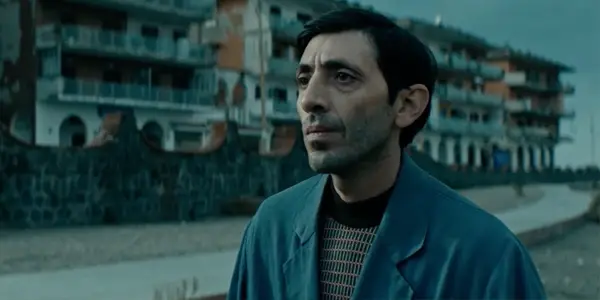
I’ll refrain from using any canine-related puns when talking about Matteo Garrone’s Dogman, as the act of doing so would be just as predictable as the film itself, a modest crime drama that once again pits David against Goliath in the outskirts of Southern Italy. The diminutive Marcello (the terrific Marcello Fonte) is this film’s David, a dog groomer who’s desperate to keep in the good graces of his local community, one that lives under the thumb of its Goliath, the monstrous Simone (Edoardo Pesce), a tight-lipped brute who tends to say more with his fists than his mouth. He’s a thug who represents masculine pride, insecurity and brutality, all toxic qualities that are missing from Marcello, the one person in town spared from his savage behaviour – probably because the passive dog groomer is also his coke dealer, a side-business that Marcello uses to fund scuba-diving trips for his 9 year old daughter.
Handled with an unpretentious stylistic assurance, Dogman details how Marcello’s fundamental humanism is his strongest and weakest aspect, a compassion that spreads from the various dogs he treats to the clients who bring them. From Chihuahuas to horse-sized Dalmatians, Marcello always manages to find their weak spots, a talent which extends to his treatment of Simone, with their notable physical difference being frequently mined for both menace and humour. The brief interludes where we watch Marcello demonstrate his flair for grooming dogs help in giving the film a surreal dimension that helps sets the tone for the more bizarre moments of the confrontational third act, which comes about when Simone pushes Marcello’s trust too far, pitting the two towards a fatal collision course that’ll change the opposing mens’ lives forever.
As seen in Garrone’s most well-known feature Gomorrah, Nicolaj Brüel’s cinematography captures Italy in a desolate and unsentimental fashion, a real change from the sun-soaked paradise of Call Me By Your Name. This pragmatic approach also feeds into the handling of the crime drama aspects, as Garrone is fairly uncompromising when it comes to the eventual bloodshed, anger and violence that erupts along the beige beachside. Dogman carries many flaws; its bleak and formal surface conceals a political and moral parable of rocky results, its narrative is formulaic and the message of the film remains ambiguous – but at the end of the day, thanks to the parade of dogs that we get to meet, it’s the first Italian crime drama that can be called ‘adorable’.
Los Silencios (Beatriz Seigner)

Despite its subject matter, Beatriz Seigner’s Los Silencios is not a ghost story, but rather a story about ghosts, observing the grief and loss of direction that death brings, in both its literal and metaphorical forms. Its not just the souls of lost loved ones that drift through each frame, but also the spirits of fellow filmmakers, whose lurking presence can be felt in Seigner’s sophomore film, especially that of Apichatpong Weerasethakul, whose notable style of blurring the line between the dead and the living haunts Los Silencios. Instead of Uncle Boonmee recalling his past lives, this spiritual tale tackles the Colombian armed conflict and how those, in either state of existing, are affected by it – this is a film about crossing borders, not all of them being geographical ones.
Reaching La Isla de la Fantasia (an island in the Amazon River) by boat in the dead of night, Amparo (Marley da Soto) and two of her children have escaped the Colombian Civil War, leaving behind her husband, a newspaper reporter who has gone missing, presumed dead. Seigner’s screenplay quietly observes their taxing struggles of becoming refugees; compensation for Amparo’s husband cannot be paid because she doesn’t have his body, any financial reparations require fees to be paid and nobody on the island wants to hire a refugee, with one boat owner remarking that “all they do is cause trouble”.
Meanwhile her two children, Nuria (Maria Paula Tabares Peña) and Fabio (Adolfo Savinino) react to their new impoverished living situation in divergent ways; Nuria seems contempt, a silent observer to the misery of those around her, whilst Fabio attempts to fast-track his way into becoming the man of the house, donning his father’s cowboy hat and finding work with the local drug contingency. The pace is measured, with its buzzing soundscape only intermittently punctured by hushed conversations, but this is a film carried by emotion, rather than narrative. It all builds to a tragically moving final act, one last celebration of life and death that is illuminated by an array of radiant fluro colours, gorgeously captured by Sofia Oggioni. It’s rare to find a new filmmaker who is able to combine the political and the personal so poetically, but Los Silencios solidifies Beatriz Seigner’s natural talent for doing so.
Donbass (Sergei Loznitsa)
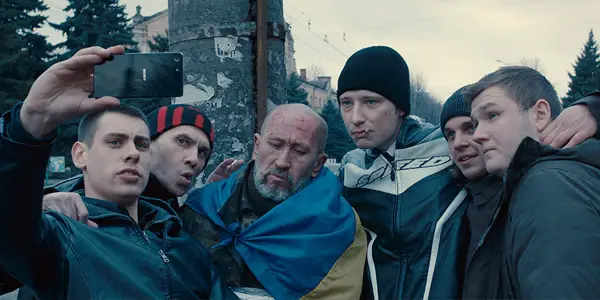
Due to its lack of media attention, its troubling to realise that the events of Donbass are still taking place, a 4 year war that has resulted in over 10 thousand casualties – if it wasn’t for the appearance of smartphones, you’d think that Sergei Loznitsa’s fractured rendition of the Ukrainian-Russian conflict was a historical document and not a slice of contemporary social realism. Delivered in an anthological style that feels like Richard Linklater’s Slacker if told through a foggy layer of depressing documentary fastidiousness, Donbass covers how war affects everyone; from journalists, citizens, the soldiers and the unfortunate victims caught in-between it all, a harsh reality that applies to any past or current international wars. Beginning with a group of extras in a makeup trailer, who are getting ready to become crisis actors in a local news broadcast, playing “witnesses” to a local attack, Loznitsa immediately establishes the motif of Fake News, one that aught to resonate with anybody disturbed with the state of conflict-driven propaganda.
The portmanteau structure starts off quite shaky, as zero political or historical context is given, so for those unaware of the battle between Ukrainian nationalists and the supporters of Russia’s Donetsk People’s Republic will be confused as to who is fighting each other and why. Luckily, Loznitsa’s segments have enough recognisable narrative elements that they work by themselves for the most part – an extended sequence featuring a drunken wedding seems perfunctory, but one assumes that it makes more sense for Ukrainian audiences, rather than from my limited Western perspective. Much like Slacker or the overlapping work of Robert Altman, this is a collection of situations, rather than a bunch of traditional linear stories, so those expecting endings or punchlines might be left unsatisfied – each of the 13 segments are merely puzzle pieces that, when put together, form a much larger picture on the tragic situation than just focusing on one singular character could ever achieve.
Each vignette is loosely connected, whether it be thematically or geographically, shifting from the fake news broadcast into a heated confrontation between a woman accused of bribery and the reporter who made the accusation. As the episodes build up, so does their brutality, as if Loznitsa is slowly easing us into the inhumanity and savagery of war – One particular scene, which sees a businessman forced to hand over his Jeep to corrupt rebellious forces, is the closest moment that the film comes to black comedy, skirting on farcical territory but refusing to let the audience laugh.
Oleg Mutu’s handheld camerawork helps in selling the palpability of each situation, especially in the select segments that are shot in a first person point of view, sticking us in the heat of the moment no matter what location or scenario. This is notably recognised in the film’s extended ending, an impressive long take that takes an uninterrupted 10 minute period to show the transition from a trailer-set massacre to the eventual news report that covers it. A new set of crisis actors show up to detail their scripted thoughts on the bloodbath, which leaves us with one lingering feeling: this war is just a continuous cycle of violence, perpetuated by indoctrination, disinformation and the constant need for retaliation. Donbass is a great example of harrowing, but undeniably compelling filmmaking.
Diamantino (Gabriel Abrantes, Daniel Schmidt)
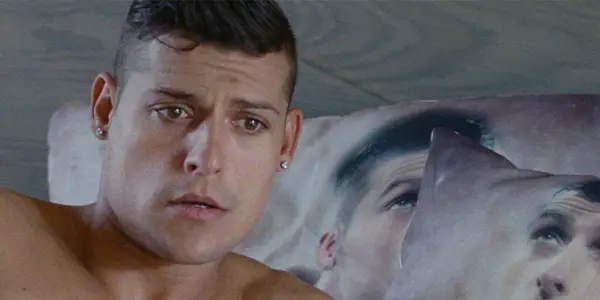
Within the first 10 minutes of Diamantino, we watch as the titular soccer player, a clear parody of Cristiano Ronaldo, goes to kick a game-winning goal during the 2018 Fifa World Cup, but instead of of a soccer stadium, he views himself in the midst of pink mist, surrounded by giant puppies who help guide him into scoring. It’s pretty obvious at this point that Gabriel Abrantes and Daniel Schmidt, in their feature film debut, are trying to make an instant cult classic, cramming in as many ridiculous visuals like this to prop up their shallow political parody, one which includes such easy lines like “Make Portugal Great Again”, delivered with the same level of careless effort as Clive Palmer’s political campaign.
“After all, who doesn’t love cute critters?” the soccer player asks us, but much like Dogman, just the sight of adorable animals alone is not enough to mask the film’s narrative flaws. It’s a simple sport-orientated redemption story that wildly careens into fantastical territory, attempting to make a fairytale from the ingredients of today’s hot topics; Trump, Brexit, the refugee crisis and society’s inclination to prop up celebrities as Gods, with Diamantino as this tale’s coveted princess in the middle of it all (don’t worry, the film makes this reversed-gender metaphor pretty literal).
“The Zeus of the Field” Diamantino (a very game Carloto Cotta), the Portugese soccer player who is considered the greatest in the world, misses a game-changing penalty kick during the tense finale of the 2018 Fifa World Cup, one that imagines the final game being between Portugal and Sweden (it was actually France against Croatia). His crying reaction is immediately material for memes, and it’s pretty obvious that the loss has cost him his career, but none of this concerns the naive athlete – after the death of his supportive father, Diamantino decides that the only way to fill the hole in his heart is to adopt a “fugee” (his scrambled interpretation of the word refugee), which opens an opportunity for government agent Aisha (Cleo Tavares) to go undercover as Mozambique refugee Rahim in order to investigate the soccer player’s potential illegal money laundering.
What she really discovers is happening is way weirder, a bizarre plot devised by Diamantino’s dominating twin sisters that includes Portugal planning a political campaign to exit the EU, cloning, breast implants and other unhinged plot developments that descend the film into straight-up schlock. Its hard to knock its ambitious nature, but with nothing to ground the film’s escalating insanity in (Diamantino is cartoonishly stupid, later told that he only operates at 10% brain functionality), it all feels like two frantic filmmakers seeing what they can get away with, quietly laughing as they pile on further absurd elements. Much like the kick that costs Diamantino his career, this one is a miss.
At War (Stéphane Brizé)
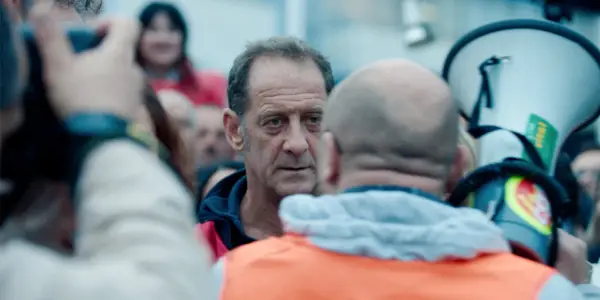
“He who fights, can lose. He who doesn’t fight, has already lost.” – this quote by Bertolt Brecht that opens Stephane Brize’s At War should tell you everything about its pessimistic tone, a socio-political drama that has the director once again collaborating with actor Vincent Lindon in this infuriating account of blue collar workers waging war against the multi-national conglomerate that fired them. This is not a conflict fought with weapons, though, but one with words, passionately shouted in protesting crowds, corporate headquarters, bars and various offices. At War is an apt title, as we observe these working-class people in various states of war; with themselves, with each other and with the administration that cruelly erased their jobs. It’s told with a brutal directness that should appeal to anybody sick of the persistent problems of corporate greed, a notion realized when a supporter writes to the workers: “We have the same assholes here. They’re everywhere”.
Brize immediately drops us right in the action, as Laurent Amedeo (Lindon), in the first of his many impassioned finger-waving speeches, informs the members of management what the problem is: 2 years ago, the French employees of Perrin Industries, a German-based automotive supplies company, signed an agreement which ensured their jobs for the next 5 years on the basis that they’d work overtime and cut bonuses. Citing low profitability, the company has decided to suddenly shut down the factory, displacing its 1,100 workers and essentially crushing the town’s shrinking economy, one which suffers from large unemployment rates already. Externalising the opening Brecht quote, Amedeo and his fellow employees (a crew of non-actors who deliver superbly naturalistic performances) refuse to let their jobs go that easily, employing a number of combative campaigns to try to level with the evasive CEOs who made the callous decision. The group’s struggles with corporate incompetence, such as their demands being constantly countered with promises as flimsy as the paper they’re written on, is reminiscent of last year’s BPM, another electrifying French picture that featured very similar aesthetic and narrative choices.
Disenchantment starts to fracture the united protesters when every step forward results in two steps back; the high courts dismiss their petitions, the Government rejects any type of intervention and every peaceful protest ends with police blockades. The German CEO Mr. Hauser, the worker’s white whale who represents the last chance at obtaining any change, also dodges their requests, as even after 3 months of resistance is responded with him “willing to consider a meeting”. As the quiet rage builds behind Amedeo’s weary eyes, so does Bertrand Blessing’s intense score, a synth-heavy rock soundtrack that, when matched with Eric Dumont’s harsh, unforgiving footage of faceless SWAT members fighting in the streets of France, gives the proceedings an apocalyptic quality. As the film builds towards its ultimate moment of eruption, it starts to feel overlong, especially when it feels like it ends several times – climaxing in a misguided attempt of thematic resonance that borders on absurdism, undercutting any sense of authenticity that came before it.
What are your thoughts on any of the films mentioned?
Does content like this matter to you?
Become a Member and support film journalism. Unlock access to all of Film Inquiry`s great articles. Join a community of like-minded readers who are passionate about cinema - get access to our private members Network, give back to independent filmmakers, and more.













